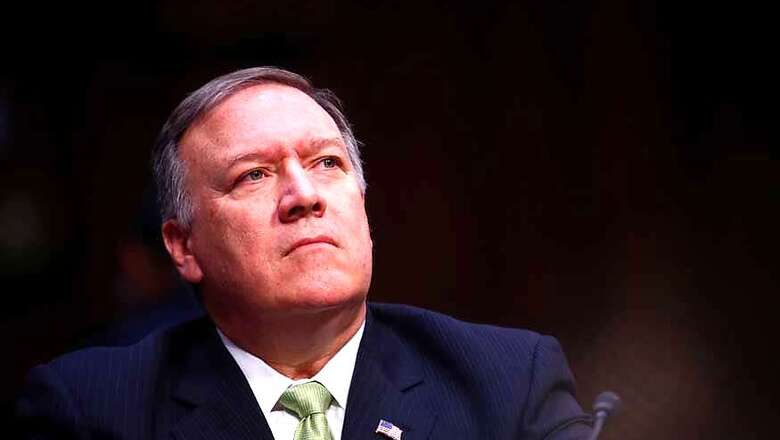
views
Washington: The US Secretary of State Mike Pompeo on Monday said by a "free and open Indo-Pacific" the Trump Administration means all nations are able to protect their sovereignty from coercion and enjoy open access to the seas and airways in the region.
The Trump Administration had been using the term "Indo-Pacific" in diplomatic circles for a broader and democratic-led region in place of "Asia-Pacific".
The move comes nine months after the Trump administration openly spoke against the "predatory economic policies of an Asian giant" that threatens to eat into sovereignty of countries in the Indo-Pacific region, which has now emerged as a critical engine for growth.
"When we say we want a 'free' Indo-Pacific, it means we want all nations to be able to protect their sovereignty from coercion by others. At the national level, 'free' means good governance and the assurance that citizens can enjoy their fundamental rights and liberties," Pompeo said, addressing the first Indo-Pacific Business Forum organised by the US Chambers of Commerce.
He said that ensuring the US citizens' rights was ultimately the great object of the economic and security cooperation.
"When we say we want an 'open' Indo-Pacific, it means we want all nations to enjoy open access to the seas and the airways. We want the peaceful resolution of territorial and maritime disputes. This is key for international peace and each country's attainment of its own national dreams," Pompeo said.
Asserting that the US' commitment to a free and open Indo-Pacific was deeply rooted, he said: "Economically, 'open' means fair and reciprocal trade, open investment environments, transparent agreements between nations, and improved connectivity to drive regional ties - because these are the paths to sustainable growth".
He said that the State Department, which he represents, established a consular presence in Kolkata then called Calcutta in 1794.
"American entrepreneurs, whom most of you in this room represent, have been trading and investing in the Indo-Pacific even longer than that. I won't give you the full history, but I will note how the US has played a foundational role in enabling the growth, development, and wealth we see across the Indo-Pacific today," he added.
"We did this partly through sustaining an international order that favoured peace among neighbours, security across the vital pathways of global commerce, and economic flourishing. Where America goes, we seek partnership, not domination," he said.
After the World War II, the US worked with Japan to forge a great alliance and stimulate an economic boom. South Korea in the 1950s was ravaged by conflict.
American assistance and investment in railways, ports, and other infrastructure helped create a foundation for our South Korean friends to recover, thrive, and build one of the world's great economies one that is now strong enough to aid other countries in their development, he said.
In the 1960s, the US grew partnerships to address basic developmental needs. It supported transformational agricultural efforts, such as the Green Revolution, which forever improved the farming of wheat and rice worldwide and nowhere more than in the Indo-Pacific, he said.
"The genius of the American scientist Norman Borlaug working with foreign partners such as (Father of India's Green revolution) M S Swaminathan and the governments of Mexico and the Philippines saved millions of lives and empowered billions more, by providing a foundation of food security from which economic miracles could grow," he added.
The US helped Hong Kong, Singapore and other Southeast Asian economies rise from the 1970s onward. In Taiwan, economic development went hand-in-hand with creating an open, democratic society that blossomed into a high-tech powerhouse. And America was proud to support foundational institutions like ASEAN, APEC, the Asian Development Bank, and others.
"As just one national example of what happens when countries engage with the United States, we see how Vietnam has risen," Pompeo said.
Trade in goods with the US has grown by a factor of fifty over the past two decades. In this decade alone, the US exports to Vietnam have increased by over 600 per cent. This has produced great returns for Americans and dramatic improvements in the Vietnamese people's material quality of life, he said.
"Thanks to this history of economic and commercial engagement, America's relationships throughout the Indo-Pacific today are characterised by mutual trust and respect. American friendship is welcomed, and American businesses are recognised for their ingenuity, reliability, and honesty," Pompeo said.




















Comments
0 comment